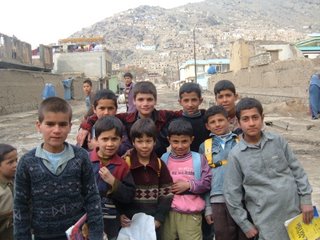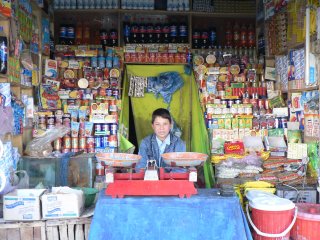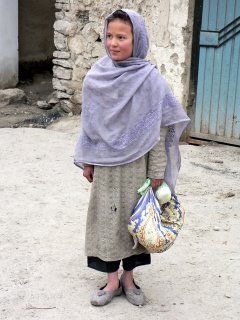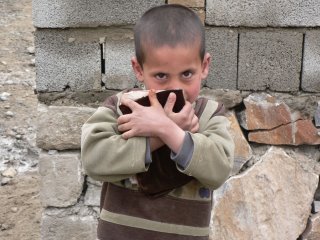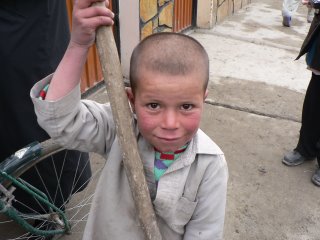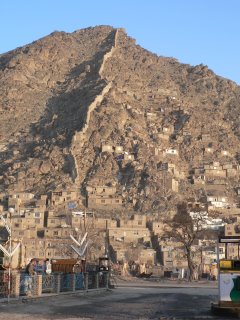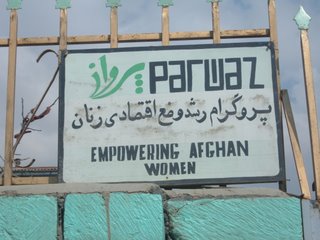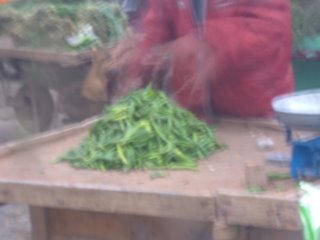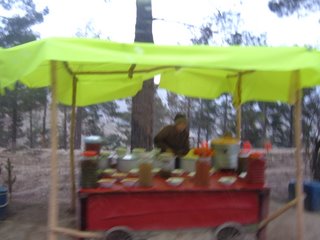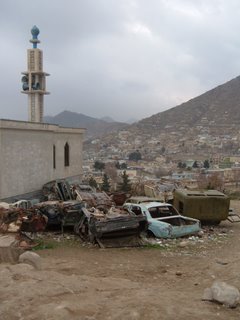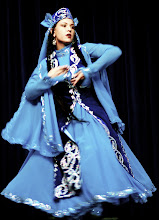Wednesday, April 12, 2006
Monday 3/6/06 Day Two (Part 1)
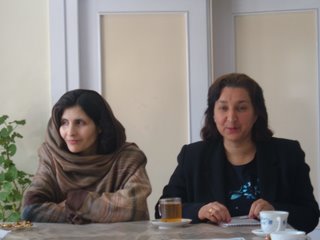 As soon as my head hit the pillow at 8:30 Sunday night, I slept straight until 6:00 AM Monday morning. I continued to rest, cuddled under my fuzzy blankets, until breakfast was served inside at 7:00. Awaiting us was a spread of fresh bread (nan), honey, black cherry jam, 'happy cow' cheese, and green and black chai.
As soon as my head hit the pillow at 8:30 Sunday night, I slept straight until 6:00 AM Monday morning. I continued to rest, cuddled under my fuzzy blankets, until breakfast was served inside at 7:00. Awaiting us was a spread of fresh bread (nan), honey, black cherry jam, 'happy cow' cheese, and green and black chai.
If I am endowed with one cultural marker as a Seattleite, it is my addiction to coffee - and not just any coffee, but quality, strong, dark roasted coffee (preferably fair trade, of course!) I had a strong sense beforehand that Nescafe Instant coffee was what would be available for us at the guesthouse, and thus the 'emergency/luxury' item I allowed myself to bring was a Ziplock bag of my own ground coffee and a travel mini-french press. Fortunately I had packed my coffee 'emergency pack' in my carry-on backpack - so even though I didn't have a change of clothes (since my luggage had not arrived), I at least had my coffee and as far as I was concerned, that was all I needed!! Recovering from jetlag would have been far more difficult without it. If there is one memory that the other delegation participants and those working at the guesthouse have of me, I would be willing to guess that it is an image of me in the mornings, groggy-eyed with mini-french press in hand, imbibing my strong brew as if it were life itself!
Sunday, April 02, 2006
Brief Chronology of Afghanistan's Political Past
The following chronology is published in My Forbidden Face - Growing up Under the Taliban: A Young Woman's Story written by a woman using the pen name Latifa written with the collaboration of Shekeba Hachemi:
1919: The Declaration of independence of Afghanistan. 1921: The Treaty of Kabul marks the end of British interference in Afghan affairs. 1933-1973: The reign of Mohammed Zahir Shah. 1959: Women are no longer required to wear the veil. 1964: Women obtain the right to vote. 1965: The first parliamentary elections. 1973: The monarchy is overthrown by Mohammed Daoud, who establishes the first Republic of Afghanistan and serves as its president. 1978: A coup d'etat installs the second republic, a Communist regime, led by President Noor Mohammed Taraki and Prime Minister Hafizullah Amin. Reforms imposed on Afghan society, which remains conservatively traditional, lead to popular uprisings and the rise of Islamic movements, which destabilize the government. 1979: Soviet troops invade. The mujahideen organize their resistance and begin a guerilla war against the Afghan army - which fight under the aegis of the Soviet army - that will last ten years. The successive presidencies of Babrak Karmal (1979-1986) and Dr. Mohammed Najibullah (1986-1992)[Made president by the Soviets, M. Najibullah was an Afghan Communist who remained in power until he was ousted by the mujihadeen.] April 1988: The United States, the U.S.S.R., Pakistan and the government in Kabul sign a UN-sponsored agreement in Geneva setting up a timetable for the withdrawal of Soviet forces from Afghanistan. 1989: The last of the Soviet troops are evacuated from Afghanistan. 1989: The beginning of the civil war among mujahideen forces of different ethnic backgrounds; the principle antagonists will be the Pastun Gulbuddin Hekmatyar and the Tajik Ahmed Shah Massoud. [A notoriously ruthless warlord, Hekmatyar first came to the attention of the West as a student at Kabul University in the 1960's, when he led a militant Islamic student group that threw acid in the faces of unveiled women students. Massoud would later become the leader of the Northern Alliance, a loose coalition of ethnic minority political parties - mostly Tajiks, Uzbeks, Hezaras - that will oppose the Taliban.] March 1992: General Massoud takes control of the northern provinces. April 1992: General Massoud's mujahideen capture Kabul. Sibghatullah Mojadeddi serves as President of the Islamic State of Afghanistan until June, when he is succeeded by Burhanuddin Rabanni. [Rabanni was the nominal head of the Afghan government-in-exile recognized by the United Nations.] Civil war flares up again, this time between forces of General massoud and Islamic extremists supported by Pakistan. The Taliban achieve their first successes in the south with the capture of Kandahar in 1994. September 1995: The Taliban take Herat (the main city in Western Afghanistan.) September 1996: The Taliban take Jalalabad and Kabul. 1997-1998: The Taliban continue their advances north. The city of Mazar-i-Sharif changes hands several times, finally falling into the hands of the Taliban in August 1998. General Massoud retreats to his home territory in the Panshir Valley and remains the sole effective opponent of the Taliban regime.[The Panshir Valley is an impregnable natural fortress that stretches southwest from northern Afghanistan to the Shamali Plain just north of Kabul.] September 9, 2001: Ahmed Shah Massoud is the victim of an assassination plot; his death is officially confirmed on Sept. 13. September 11, 2001: The World Trade Center in New York City and the Pentagon in Washington D.C. are attacked by terrorists in hijacked commercial airlines. The hijackers are believed to be members of Osama bin Laden's Al-Queda organization. October 7, 2001: United States and Britain lead bombing offensive against Al-Queda. November 9, 2001: After a month-long American campaign of bombing, the Northern Alliance regains control of Mazar-i-Sharif. November 13, 2001: The Taliban abandon Kabul overnight; forces of the Northern Alliance enter Kabul. December 22, 2001: Hamid Karzai is sworn in as the leader of an interim government, as agreed in talks held in Bonn, Germany earlier that month. The coalition is endorsed by Mohammed Zahir Shah, and its thirty members include representatives of several Afghan factions. Karzai is the first person to take power in Afghanistan peacefully in thirty years.
Saturday, April 01, 2006
Sunday 3/5/06 Day One (part 4)
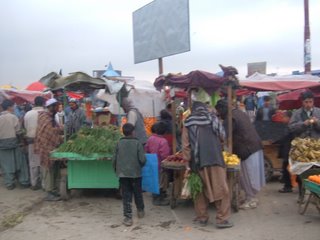
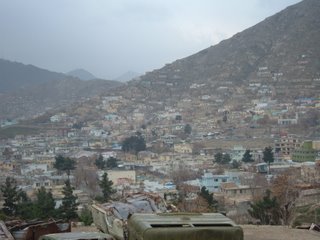 The aroma of our first scrumptious lunch drifted from the kitchen as we began to settle into what would be our home for the upcoming ten days. We briefly met our cooks, two men with kind faces and an older woman with silver hair tinted orange with henna peeking from under her headscarf. After introductions, they politely ducked back into the kitchen to finish preparing our welcoming lunch.
The aroma of our first scrumptious lunch drifted from the kitchen as we began to settle into what would be our home for the upcoming ten days. We briefly met our cooks, two men with kind faces and an older woman with silver hair tinted orange with henna peeking from under her headscarf. After introductions, they politely ducked back into the kitchen to finish preparing our welcoming lunch.Elliot reflects in An Unexpected Light, "I had seen photographs of Kabul in guidebooks from the 1960's and the sights had hardly changed. Years of conflict had paralyzed the hand of modernization. In the side streets time's touch was lighter. The roads grew more dusty; here shops and homes made from mud brick and timber bore the neglect less visibly than modern buildings. Shrouded women carried water in earthen vases and venerable, turbaned shepherds prodded their flocks forward at a timeless pace. Spice sellers sat between multicoloured mounds or weighed out flour and grain on scales balanced with stones, and at the butchers' stalls men hacked with iron axes at carcasses on wooden stumps polished and gently concave from years of use, and laid out severed heads in long rows like the grisly trophies of medieval conflicts."
Photos by Kristie McLean
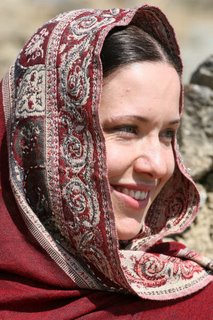 "Once snared, as you so well know, one never fully leaves; a portion of one's heart is forever woven into the fabric of that place." Jason Elliot speaks of Afghanistan in An Unexpected Light.
"Once snared, as you so well know, one never fully leaves; a portion of one's heart is forever woven into the fabric of that place." Jason Elliot speaks of Afghanistan in An Unexpected Light.
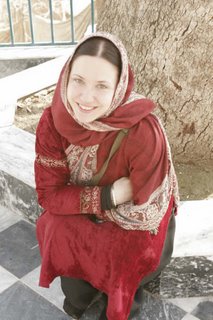 These are two photos taken (and copyright) by Kristie McLean, another woman from Seattle who also attended the delegation.
These are two photos taken (and copyright) by Kristie McLean, another woman from Seattle who also attended the delegation.
